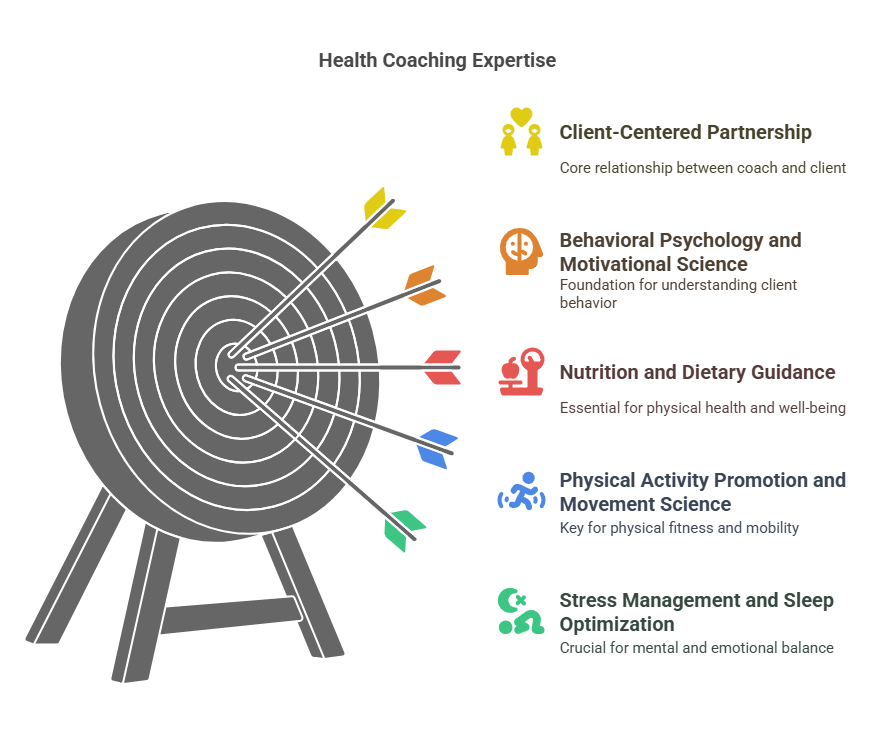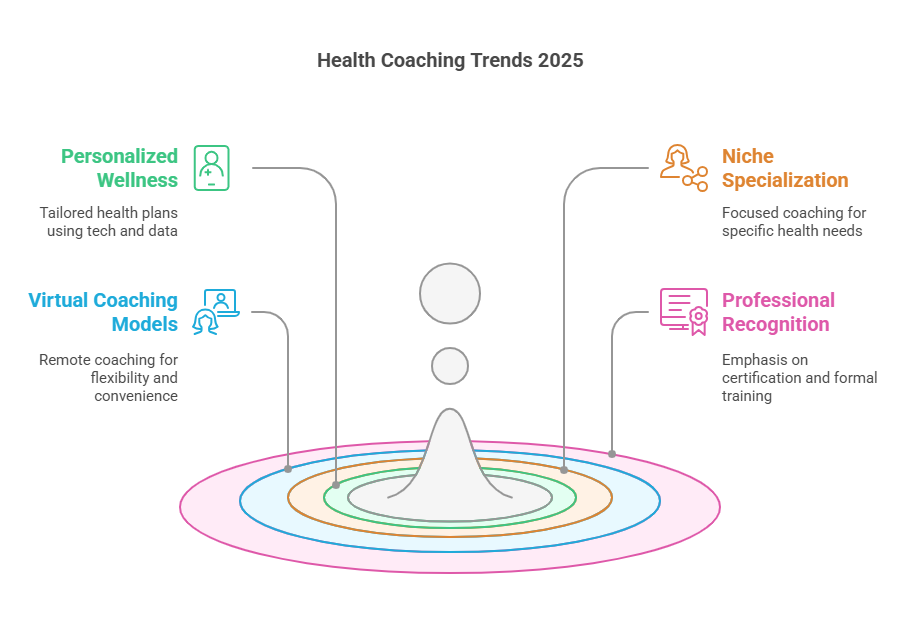The Art of Coaching: Mastering Health and Wellness
Health coaching has evolved into a powerful and evidence-based discipline that bridges the gap between clinical care and sustainable lifestyle change. It’s not merely about guiding a client through a meal plan or exercise routine; it’s about building trust, fostering self-efficacy, and applying science-backed strategies that promote long-term well-being.
At ANHCO, a leading authority in health coach training, we empower wellness professionals with the tools, knowledge, and support needed to transform lives. This guide explores the essential components of health coaching, the science behind it, and the modern methods shaping coaching in 2025.
What is Health Coaching?
Health coaching is a client-centered partnership that supports individuals in achieving their physical, emotional, and mental wellness goals. A certified health coach acts as a mentor and behavior change specialist, helping clients navigate health challenges and implement sustainable lifestyle habits.
Health coaching involves a blend of expertise in areas such as:
Behavioral psychology and motivational science
Nutrition and dietary guidance
Physical activity promotion and movement science
Stress management and sleep optimization
Health literacy and goal setting
Preventive care and chronic condition management
Modern coaches are equipped not only with a strong foundation in wellness principles but also with advanced communication techniques that facilitate meaningful change.
The Role of a Certified Health Coach
According to the National Board for Health & Wellness Coaching (NBHWC) and other industry bodies, a health coach's role includes:
1. Assessing Client Readiness and Goals
Effective coaching begins with a comprehensive intake that evaluates the client’s current health status, lifestyle behaviors, and personal goals. Tools like health risk assessments, behavior questionnaires, and biometric screenings may be used.
2. Creating Individualized Wellness Plans
Coaches design custom programs that align with a client’s unique preferences, values, and readiness to change. These may include nutritional guidance, activity plans, stress reduction strategies, and sleep hygiene protocols.
3. Facilitating Behavior Change
Health coaches use techniques rooted in behavioral psychology and motivational interviewing to help clients shift habits and overcome barriers. Emphasis is placed on empowering the client rather than prescribing actions.
4. Offering Ongoing Support and Accountability
Regular coaching sessions provide continued encouragement, progress evaluation, and plan adjustments. Accountability is a key factor in client success.
5. Educating and Advocating
A health coach educates clients about relevant health topics, from anti-inflammatory diets to circadian rhythm health, and may collaborate with other healthcare professionals as part of a multidisciplinary approach.
Key Skills Developed Through ANHCO’s Health Coach Training
The effectiveness of a health coach hinges on the skills and knowledge acquired during formal training. At ANHCO, our curriculum aligns with 2025 standards for coach certification and professional development.
Active Listening and Empathetic Communication
Coaches must listen deeply and respond with empathy, helping clients feel heard and supported throughout their wellness journey.
Motivational Interviewing
This client-centered technique is used to explore ambivalence, uncover intrinsic motivation, and encourage clients to take ownership of their choices.
SMART Goal Setting
Clients are guided in setting Specific, Measurable, Achievable, Relevant, and Time-bound goals to promote progress and self-confidence.
Health Literacy and Lifestyle Education
Our training covers a wide range of wellness topics, including gut health, metabolic flexibility, anti-stress protocols, functional nutrition, and hormone balance.
Technology Integration
In 2025, health coaches must be comfortable using telehealth platforms, wellness tracking apps, and biometric data to monitor and enhance client outcomes.
The Science Behind Health and Wellness Coaching
Health coaching is deeply rooted in scientific disciplines, including:
Behavioral Psychology
Understanding the stages of change (Prochaska’s Transtheoretical Model), cognitive-behavioral strategies, and habit formation frameworks allows coaches to facilitate transformation more effectively.
Nutrition Science
Coaches learn foundational principles of whole food nutrition, meal timing, blood sugar regulation, and how dietary choices impact inflammation, energy, and mood.
Exercise Physiology
Understanding the connection between movement and metabolic health enables coaches to provide safe and effective activity recommendations tailored to individual needs.
Mind-Body Medicine
Training includes stress reduction techniques like mindfulness, breathwork, and cognitive reframing, which are integral to a holistic coaching model.
Trends in Health Coaching for 2025
As the wellness industry matures, new trends and technologies are reshaping how health coaching is delivered and received.
1. Personalized, Precision Wellness
Thanks to wearable tech and AI-powered health platforms, clients receive tailored wellness recommendations based on their genetic profile, microbiome, and real-time biometrics.
2. Specialization in Niche Areas
Coaches are increasingly focusing on niche populations and areas, such as:
Chronic disease coaching (diabetes, cardiovascular disease, PCOS)
Workplace wellness and executive health
Women’s hormonal health and menopause support
Sleep coaching and circadian rhythm regulation
3. Virtual and Hybrid Coaching Models
With clients expecting flexibility and digital convenience, virtual health coaching continues to grow. ANHCO offers remote health coach training programs designed for modern professionals.
4. Licensing and Professional Recognition
There’s a growing emphasis on national board certification and formal training through accredited institutions. ANHCO remains at the forefront of this shift, with programs designed to meet or exceed NBHWC guidelines.
Building Strong Coach-Client Relationships
Trust is the foundation of effective coaching. Building rapport through active listening, consistent communication, and shared goal setting helps clients stay engaged and motivated.
Strategies for Building Trust
Offer transparent communication and consistent follow-through
Personalize interactions based on client values and needs
Celebrate milestones and reflect on wins, big or small
Maintain professional boundaries while cultivating a supportive, human connection
Success Stories: The Impact of Health Coaching
Case Study 1: Sustainable Weight Loss through Lifestyle Change
A 42-year-old client achieved a 30-pound weight loss by adopting mindful eating habits, walking 30 minutes a day, and eliminating ultra-processed foods. Her coach helped her transition away from all-or-nothing thinking and build a sustainable routine.
Case Study 2: Managing Type 2 Diabetes with Nutrition and Movement
A client diagnosed with Type 2 diabetes was able to reduce insulin dependence after six months of coaching focused on blood sugar stabilization, Mediterranean-style meal planning, and strength training. The result: improved A1C levels, increased energy, and renewed confidence.
Why Choose ANHCO for Your Health Coach Training?
At ANHCO, we offer immersive, evidence-based health coach training programs designed to prepare students for success in today’s evolving health and wellness landscape. Our curriculum is rooted in science, aligned with national standards, and enhanced by expert faculty support.
Our Training Includes:
A board-aligned core curriculum
Live virtual classroom sessions
Real-world client practicum experience
Preparation for NBHWC board certification
Career support and community access
Whether you are transitioning into a new career or expanding your existing wellness expertise, ANHCO provides the education and support needed to thrive.
Continuing Education and Lifelong Learning
Staying updated with current research, methodologies, and tools is essential for every health coach. ANHCO offers ongoing education through:
Advanced coaching certifications
Specialized workshops (e.g., gut-brain connection, stress resilience, somatic coaching)
Industry conferences and community learning events
Access to alumni resources and continuing education credits (CEUs)
6 Lesser-Known Facts About Health and Wellness Coaching
Health Coaching Can Reduce Healthcare Costs
Leads to fewer emergency room visits, hospital admissions, and overall healthcare costs.
Chronic disease management through lifestyle changes reduces financial burden on individuals and healthcare systems.
Coaching Improves Mitochondrial Health
Health coaching programs targeting movement, breathwork, and anti-inflammatory nutrition can enhance mitochondrial function.
Improved mitochondrial health contributes to better energy production, aging, and chronic disease prevention.
Coaching Builds Neuroplasticity
Supports behavior change by rewiring the brain and reinforcing new habits.
Strengthens neural pathways while weakening old, unhelpful patterns.
Cultural Competency is an Emerging Coaching Standard
Health coaches are learning to understand cultural differences in health practices, beliefs, and communication.
Culturally aware coaching leads to more personalized and effective care.
The Gut-Brain Axis is a Coaching Hotspot
Growing awareness of how gut health impacts mental well-being.
Coaches focus on improving the gut microbiome with foods like probiotics, prebiotics, and fiber to boost mood, cognitive function, and emotional resilience.
Certified Health Coaches Are Being Hired in Clinical Settings
Health coaches are now integrated into clinical care teams in hospitals and primary care offices.
They help with patient follow-up, improve adherence to treatments, and bridge the gap between doctor visits and sustainable lifestyle change.
Final Thoughts
Health coaching is both an art and a science—a dynamic, rewarding profession built on relationships, results, and lifelong learning. As the industry continues to expand in 2025 and beyond, the demand for highly skilled, board-certified health coaches continues to rise. If you're ready to make a lasting impact on others’ lives and elevate your career, ANHCO’s health coach training programs are the next step in your journey. Explore our upcoming training cohorts and start your path toward becoming a certified health coach with ANHCO.
FAQS
-
This program is designed to equip health and wellness professionals with the skills, tools, and mindset needed to become transformative coaches. It blends behavioral science, communication strategies, and practical application to elevate coaching impact.
-
It's ideal for health coaches, fitness professionals, nutritionists, life coaches, wellness consultants, and anyone looking to improve their ability to guide others toward lasting change.
-
No prior experience is required. The course is designed for both beginners and seasoned professionals. Foundational principles are covered early on, with more advanced techniques introduced progressively.
-
Topics include motivational interviewing, habit formation, goal setting, mindset coaching, client communication, and building a sustainable coaching practice.
-
The course is delivered online through video lessons, interactive modules, live Q&A sessions, and downloadable resources. You can learn at your own pace with lifetime access to materials.
-
Yes. Upon successful completion of the program, you will receive a certificate of completion that can be used for continuing education credits (where applicable).





